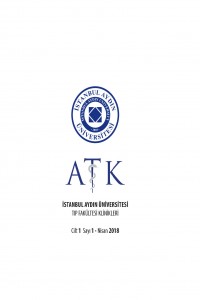Abstract
Polikistik over sendromu (PCOS), kompleks ve heterojen özellik gösteren ve üreme çağındaki
kadınları en yaygın olarak etkileyen bir endokrinopatidir. Etyopatogenezi tam olarak
açıklanamamıştır. İnsülin rezistansı, hiperandrojenemi ve dislipidemi gibi multipl faktörler
ileri sürülmüştür. PCOS’lu kadınlarda insülin rezistansı, kompansatuar hiperinsülinemi,
hiperandrojenemi, ovulatuar bozukluklar, dislipidemi ve obesite gibi pekçok klinik ve
biyokimyasal bozukluk görülebilmektedir. Sebebe yönelik kesin bir tedavi olmayıp,
semptomlara, hastanın şikâyet ve isteklerine göre tedavi planı değişiklik göstermektedir. Hangi
klinik etkiyi hedeflediğimize göre ve bireyden bireye değişiklik gösteren geniş bir tedavi
seçeneği vardır. Günümüzde kullanılmakta olan ve yeni geliştirilen hiçbir farmakolojik ajan tüm
semptomları giderememekte ve her hastada aynı sonucu vermemektedir. Metformin PCOS’a
eşlik eden hemen tüm semptom ve bulguları iyileştirebilme potansiyeli ve oldukça geniş etki
spektrumuyla PCOS da güçlü bir terapötik ajan gibi durmaktadır. Ancak Metformin ile yapılan
bazı çalışmalarda sonuçlar birbiri ile uyumlu olmayıp, kafa karıştırıcıdır. PCOS’un heterojen
yapısı, metformin doz ve sürelerinin çok farklı olması ve metformin taşıyıcı proteinlerdeki
(OCT 1) genetik varyasyonlar metformine farklı klinik cevaplar oluşmasına yol açabilir.
PCOS’lu kadınları klinik ve biyokimyasal parametrelere göre subgruplara ayırarak fenotipler
detaylı olarak tanımlanmalıdır. Metforminin etkinliğinin tam olarak gösterilebilmesi için iyi
dizayn edilmiş, çok merkezli, prospektif çalışmalara ihtiyaç vardır. Güncel literatür taraması ile
PCOS ve metformin ilişkisini özetlemek ve PCOS da metformin kullanımına yeniden dikkat
çekmek bu derlemenin hedefini oluşturmaktadır.
References
- 1. Rotterdam ESHRE/ASRM-Sponsored PCOS consensus workshop group. Revised 2003 consensus on diagnostic criteria and longterm health risks related to polycystic ovary syndrome (PCOS). Hum Reprod 2004;19: 41–7.
- 2. Al-Ruthia YS, Al-Mandeel H, AlSanawi H,.et al. Ovulation induction by metformin among obese versus non-obese women with polycystic ovary syndrome. Saudi Pharm J. 2017;25 (5): 795-800.
- 3. Bednarska S, Siejka A. The pathogenesis and treatment of polycystic ovary syndrome: What’s new? Adv Clin Exp Med. 2017;26(2): 359–367.
- 4. 2017 Royal College of Obstetricians and Gynaecologists RCOG Scientific Impact Paper No. 13 e307 of e313 Metformin therapy for the management of infertility in women with polycystic ovary syndrome.
- 5. Abu Hashim H, Foda O, Ghayaty E. Combined metformin-clomiphene in clomiphene-resistant polycystic ovary syndrome: a systematic review and meta-analysis of randomized controlled trials. Acta Obstet Gynecol Scand. 2015;94(9): 921-30.
Abstract
Polycystic ovary syndrome (PCOS), a heterogeneous and complex syndrome, is the most
common endocrinopathy that affects women during their reproductive years. Its etiopathogenesis
is not completely elucidated and it has been proposed that there are multiple causative factors
such as increased insulin resistance, dyslipidemia, and hyperandrogenemia. There have been
often presented clinical and biochemical disorders such as insulin resistance, compensatory
hyperinsulinemia, hyperandrogenemia, obesity, ovulation disorders, infertility, dyslipidemia
in women with PCOS. There is no definitive treatment for the cause, and the treatment plan
changes according to symptoms and wishes of the patient. There is a wide range of treatment
options which varies depending on the individual and desired clinical effect we target. No
pharmacologic agent that is currently used and/or newly developed do relieve all symptoms
and give the same result in every patient. Metformin appears to be a potent therapeutic agent
in PCOS, with a potentially broad spectrum of effects that can cure almost all symptoms and
signs associated with PCOS. However, the results of some studies in which metformin is used,are not compatible and confusing. Different clinical responses to metformin in women with PCOS may
genetic variation of OCT1 which is a metformin transporter protein. Dividing into subgroups according
to clinical and biochemical parameters, phenotypes in women with PCOS needs to be described in detail.
There is a need for multicenter, well-designed, prospective studies to accurately demonstrate the efficacy of
metformin. To summarize the relationship between PCOS and metformin by looking over current literature
and to draw attention to the use of metformin in PCOS is the target of this review.
References
- 1. Rotterdam ESHRE/ASRM-Sponsored PCOS consensus workshop group. Revised 2003 consensus on diagnostic criteria and longterm health risks related to polycystic ovary syndrome (PCOS). Hum Reprod 2004;19: 41–7.
- 2. Al-Ruthia YS, Al-Mandeel H, AlSanawi H,.et al. Ovulation induction by metformin among obese versus non-obese women with polycystic ovary syndrome. Saudi Pharm J. 2017;25 (5): 795-800.
- 3. Bednarska S, Siejka A. The pathogenesis and treatment of polycystic ovary syndrome: What’s new? Adv Clin Exp Med. 2017;26(2): 359–367.
- 4. 2017 Royal College of Obstetricians and Gynaecologists RCOG Scientific Impact Paper No. 13 e307 of e313 Metformin therapy for the management of infertility in women with polycystic ovary syndrome.
- 5. Abu Hashim H, Foda O, Ghayaty E. Combined metformin-clomiphene in clomiphene-resistant polycystic ovary syndrome: a systematic review and meta-analysis of randomized controlled trials. Acta Obstet Gynecol Scand. 2015;94(9): 921-30.
Details
| Primary Language | Turkish |
|---|---|
| Journal Section | Review |
| Authors | |
| Publication Date | April 1, 2018 |
| Published in Issue | Year 2018 Volume: 1 Issue: 1 |

